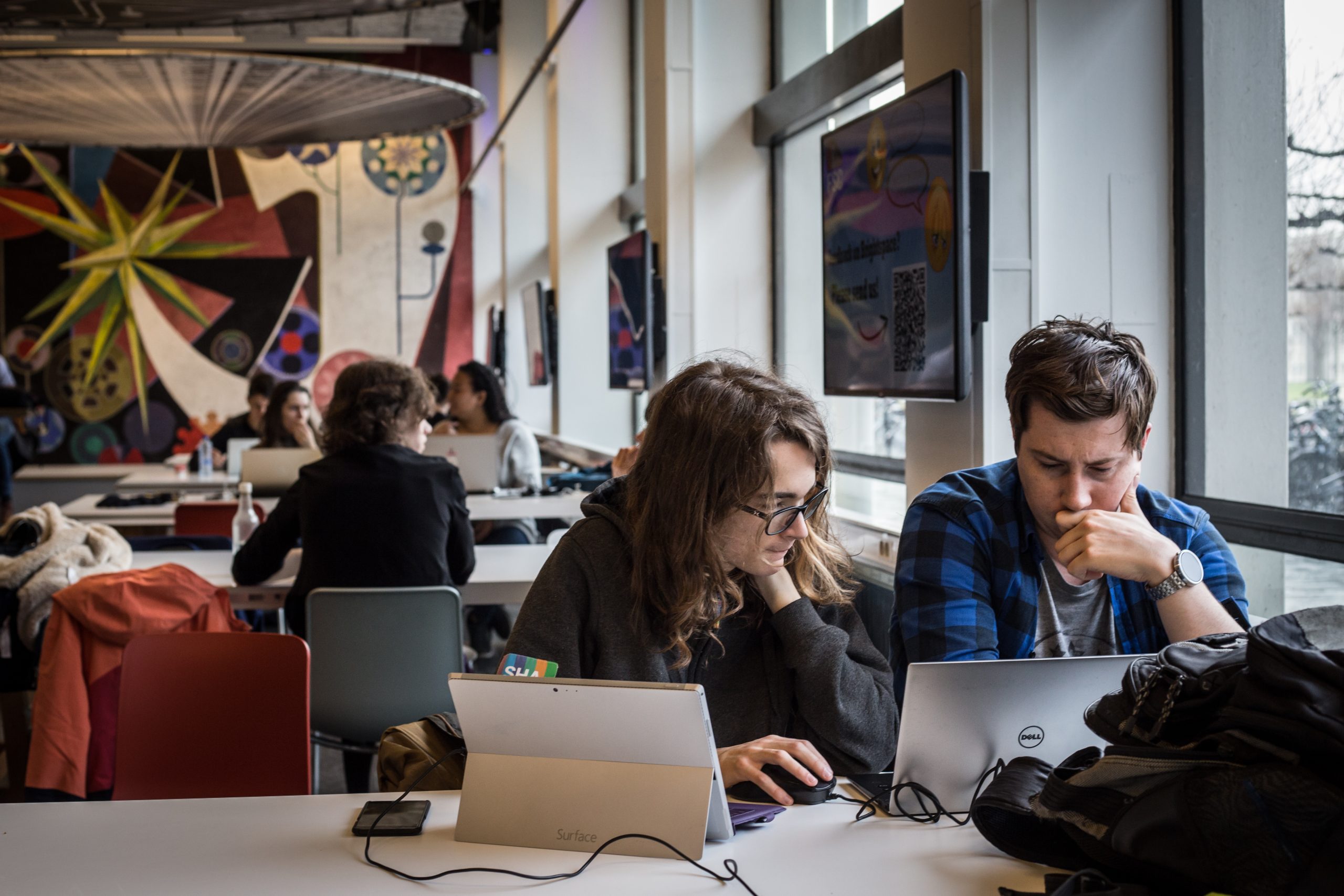Preliminary registrations for the Bachelor’s in Computer Science Engineering have risen dramatically. It is now being considered whether a numerus fixus cap should be set on student intake for the degree programme next year.
Students in the increasingly popular Faculty of Electrical Engineering, Mathematics and Computer Science. (Photo: Thomas Zwart)
The number of preliminary registrations for Computer Science Engineering is now at 622; the total number of enrolments (including programme switchers and restarters) in October last year was 433. Officially, students can enrol until 1 May. The 622 who have already done so are ‘weighted preliminary registrations’, which means they have registered for three programmes and are counted as one-third of a registration.
“Alarming,” says Director of Studies, Hans Tonino, on the number of weighted preliminary registrations. Does the faculty actually have enough room for all these students? “Not if that number rises to a thousand,” explains Tonino. “We could fit them into the main auditorium, but we do not want to be inundated.” Should a numerus fixus cap be introduced then, as has been done at Eindhoven? “That is one of the things we are considering.”
“Cyber security, blockchain and bitcoins are very much in the public eye today”
An increase was already noticeable last year, when the number of enrolments rose to 433, up from 259 in 2016. It was also the year the programme started to be taught in English. Dutch, though, continued to be a language requirement, due to it being a transition year, explains Tonino. “This meant that the majority of enrolments came from the Netherlands.” This year, however, the Dutch-language requirement has been dropped. He says half of the registrations now come from non-EU countries. There is now an English-language requirement.
Tonino believes that dropping the Dutch-language requirement is one of the reasons for the increase in interest. Although the actual reason for the increase still needs to be fully assessed, he points to a number of other possible causes:
- The name of TU Delft is becoming increasingly well-known globally.
- A possible effect of Brexit, resulting in students opting to study elsewhere than the UK.
- Current foreign policy in the US, which excludes certain categories of foreign nationals.
- The fact that the Netherlands is at the forefront of countries offering programmes in English. Tonino says that he was informed by a German student that there was no English-language alternative in Germany.
- The numerus fixus cap of 250 students for this programme at Eindhoven University of Technology, where the registration deadline was 15 January. Students probably used their fallback option by also registering directly at TU Delft.
- The great demand for computer-science graduates. “Cyber security, blockchain and bitcoins are very much in the public eye today,” says Tonino.
According to policy officer Eric Logtenberg, it is difficult to predict how the numbers will develop. “We will only know in March whether the numbers will continue to rocket or flatten out. The deadline for registration is taken to be 1 May, although this not official. Pre-university students, though, are encouraged to register by that date so that they can run a programme-choice check. So we’ll only know definitely around the start of May” May is also the month that TU Delft would prefer to have clarity on a numerus fixus so as to be able to provide information to prospective students. “In any case, before 1 September,” confirms Logtenberg.
Another point is that international students were able to register for the upcoming academic year at TU Delft through both Studielink and the Osiris student administration system. This means that their preliminary registration for TU Delft was known earlier in the year. However, this does not explain the increase in registrations for Computer Science Engineering, because last year it still had a Dutch-language requirement. It is nevertheless true that international students often register earlier, owing to the number of stages they have to go through in the enrolment procedure.
Do you have a question or comment about this article?
c.j.c.vanuffelen@tudelft.nl


Comments are closed.